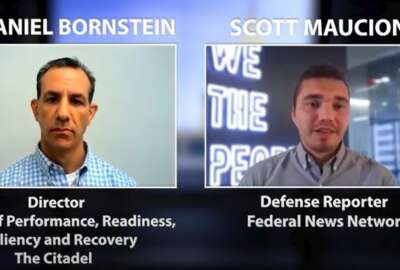Recognition for military members not on the front lines
A medical non-profit named for the legendary senator Henry M. Jackson, each year recognizes distinguished military medicine practitioners.
Every military service member needs medical attention at some point in his or her career. A medical non-profit named for the legendary senator Henry M. Jackson, each year recognizes distinguished military medicine practitioners. For more, the Federal Drive with Tom Temin spoke with the foundation’s senior vice president Cynthia Gilman.
Interview Transcript:
Tom Temin And tell us a little bit more about the foundation itself. We should give it its full name, the Henry M Jackson Foundation for the Advancement of Military Medicine. And you are both a foundation. You support the military members and also are a research contractor in military medicine matters.
Cynthia Gilman That is all correct. And I will also tell you, because of the length of the name we shorthand, it frequently is HJF. So HJF was the brainchild of the United States Congress almost 41 years ago, and it was spearheaded by then Senator Henry Jackson ‘Scoop’ Jackson from the state of Washington. He recognized, as did others, that military medicine and the education process for military physicians and nurses was somewhat hamstrung in that they were federal organizations. And so, in order to be able to partner with the civilian sector and to receive private dollars, there needed to be a nonprofit organization created in order to help advance military medicine. And so, Congress authorized the creation of HJF, which was named for the Senator after his untimely passing. In order to do just that, and we have the singular mission of advancing military medicine. And one other thing that makes our organization very distinct from others is that Congress thought this mission so important that by operation of law, the leaders of the House and the Senate sit on our Council of directors, also known as a board of directors, and help to make sure that that they ensure that we are doing what Congress 41 years ago wanted us to do, which is to advance the care and treatment for our service members.
Tom Temin Is one of the foundational ideas, maybe the fact that the expansion of military knowledge and military medical knowledge and treatment of service members should not only advance rapidly during conflict, which typically has given rise to new techniques and procedures because of battlefield events. But maybe there’s the holistic approach, because there are so many members that maybe aren’t in battle frontline situations, but nevertheless are under military health system care.
Cynthia Gilman Absolutely. And there’s a saying the only winner in war is medicine. And so, throughout history, we have seen tremendous advances in military medicine that have occurred because, there needs to be quick responses to new conflicts that are encountered on the battlefield. And whatever advances happen within the military system always make them their way out to the civilian sector. But to your point, most injuries that are sustained by military members don’t happen on the battlefield training type. Injuries occur very frequently. And then we also see ebbs and flows of combat through time. So, we may see times when there’s a lot of advances on the battlefield. But right now, it’s a little bit quieter. Certainly, our special forces are deployed all around the world, and they’re encountering dangers every day, but it is an imperative that the military medical system retain its ability to respond at a moment’s notice if and when called upon to do so. And so, there are constant efforts underway both within the military system, but then also with very strategic partnerships with their civilian counterparts, to make sure that the military medical community is always at the ready.
Tom Temin And just out of curiosity, what are some of the leading areas for research into military medicine? You know, outside of that battlefield injury area?
Cynthia Gilman You know, service members are humans, too. And so, whatever anyone may encounter, in day-to-day life, then military members will encounter it as well. So, we say it’s from AIDS to Zika, and everything in between is the type of research that we will support. Whatever military medical researchers would like to pursue, we will assist them. We maintain about 1500 active research protocols at any one time, and we, support over 600 awards that we manage. Again, there’s a whole variety of topic areas that, the military medical community pursues that HJF is there to assist with.
Tom Temin We’re speaking with Cynthia Gilman. She’s senior vice president of the. Henry M Jackson Foundation for the Advancement of Military Medicine. The HJF will call it by its short name, and I imagine. Mental health issues have risen in importance and prominence in recent years.
Cynthia Gilman Absolutely. So, I’m very pleased to report that HJF supports a number of mental health related research initiatives, whether it’s associated with TBIs, PTSD, depression. We also, about eight years ago, saw that there was a gap that existed when service members were leaving service and transitioning out of service in that they were no longer under the purview of the DoD, and they may or may not register with the VA. And we knew that there were a number of challenges that were facing our transitioning service members. So, we initiated a public private study. We’ve had about 9700 service members that we followed through that transition experience, and it was a three-year study longitudinal that while we wrapped up our portion of the study, I’m delighted that Penn State and VA are carrying on with these members of the same cohort. And we are seeing that mental health struggles in that population are real. And there is a lot of work that is continuing to be done by the DoD, by the VA, and by HJF. We hold Convenings twice a year. We have one coming up in June, where we are bringing together DoD, VA, and civilian leaders to talk about what more can be done to try to head off problems that may be encountered, particularly by high-risk individuals, before they ever leave service. So, it’s a focus area that, fortunately, is being looked at by the VA. But recognizing every service member veteran goes home to a community somewhere. So, it’s imperative that we bring the private sector into this discussion, too.
Tom Temin And let’s get to the awards program recently concluded for this year. Each year, you single out people from the armed services that are medical practitioners. Also, there’s uniformed and civilian. Give us a sense of what types of credentials you’re looking for the awards program. And, you know, maybe describe a couple that came to your mind this year.
Cynthia Gilman Absolutely. So, thank you. We call this the heroes of military medicine. And because we love acronyms, we call it Hmm for short. This is the 14th year that we produced this event, and the reason that we started this 13 years ago was because we recognized that we have an all-volunteer military, and there is a promise that is made to those who are willing to join that should something happen to them, to their loved ones, to their children, to their spouses on the battlefield, that the military medical community is going to get there, bring them home and help them go on and either go back into battle or, transition home and live thriving lives. And they do that. They do that every day, the medical community. But they’re very humble and they do not sing their own praises. And that’s where we come in. And we recognize that the term hero is used a lot these days, but these individuals truly are heroes. They will go into the battlefield; they will work in the most austere environments. They can’t press the button and ask for more help from down the hall, but they will deliver lifesaving care, in combat situations, on airplanes and truly in the most austere environments. And so, we honor individuals from each service from the Army, Air Force, Navy, as well as a civilian from selected by the Defense Health Agency, who are themselves outstanding representatives of those willing to, to sacrifice in that way for others. But then also they represent all the other military medical heroes who are working right now around the world to do the very same thing.
Tom Temin And let’s just talk about one of them that came to catch my eye, Lieutenant Colonel and Doctor Carrie Lucas, chief of the Behavioral Health Branch, Air Mobility Command for the Air Force. And, had a pretty impressive record there.
Cynthia Gilman Absolutely. She is an Air Force clinical social worker. Her focus area truly is on the mental health well-being of servicemen and women. And what is wonderful is that she represents that topic area, as do all of the other honorees represent a very diverse, spectrum of what military medicine represents. We have a Navy honoree who is a general surgeon, trauma critical care physician. We had an arson case manager. We have medical surgical nursing represented, and we also had an, what we call our ambassador honoree that represents how the military also advancements that are made for service members also translate into helping the civilian population as well. And this year we honored the C Star Cincinnati program. And you can say, well, I a Cincinnati program, because that’s emblematic of how our civilian colleagues are partnering with the DoD to make sure that our readiness, is retained. And then also, it allows our medical expertise from the military battlefield to be brought to civilian communities. And so, one example that is represented by, Colonel Valerie Sams, who’s a trauma surgeon who accepted the award on that behalf. She and her colleagues were there to help when Buffalo Bills, star DeMar Hamlin sustained a blunt chest trauma injury during a football game. He was brought there, and he was resuscitated. And he is back on the football field again. But they also, train what we call the Seacat program participants. Critical care air transport team. This is the intensive care Air Force group in the sky that will fly anywhere, at any time to recover a severely wounded warrior, bring them back home and, provide them the type of outstanding care that they deserve.
Copyright © 2024 Federal News Network. All rights reserved. This website is not intended for users located within the European Economic Area.
Tom Temin is host of the Federal Drive and has been providing insight on federal technology and management issues for more than 30 years.
Follow @tteminWFED







